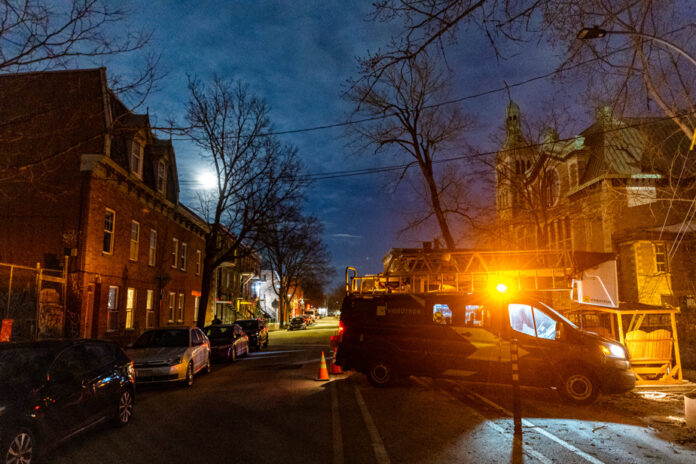“There was no electricity at all for three days. Power came back about 36 hours ago. Still no internet. We are in the H2V zone,” Rae wrote on Easter Sunday.
“Still waiting for internet in Saint-Laurent H4L,” Maha added hours later.
“Me too Maha!” “relaunched William.
The exchanges were going well, during the Easter holiday, on the page attributed to Videotron on the site downdetector.ca, which lists the breakdowns reported by users in various telecommunications services or online services.
In some areas, users have lost cellular or internet service while they still had electricity. Others have regained electricity without their internet connection resuscitating.
Another paschal mystery, for the neophyte.
“Even when power is restored to an area, telecommunications services may still be affected there, especially if network infrastructure (e.g., telecommunications tower and wired network distribution) is in an adjacent area that is not yet supplied with electricity,” Videotron’s public affairs team explained by email.
Other breakdowns of the Videotron distribution network, whether for television, telephony or the Internet, may have been caused by damage to its wires and equipment.
Bell experienced similar difficulties. “Most of the impact on our internet service is due to widespread power outages. All other impacts to internet service were due to cables being damaged by branches and fallen trees,” said Vanessa Damha, Senior Manager for Media Relations, also via email.
Even on wireless networks, you could lose track of the conversation.
“There were antennas that broke down due to lack of electricity,” said Bruno Guglielminetti, host of the digital news podcast Mon Carnet. “Obviously it’s bad enough to work when there’s no electricity. »
Some users could text without being able to converse, others could talk but had no access to internet data.
“Wireless networks are dependent on power supply, and cell sites can cover a great distance depending on line of sight and population density. Therefore, even if a customer has electricity in their home, there may have been a power outage at the cell site itself,” Vanessa Damha informed.
“Some customers experienced wireless network congestion because people were using their mobile devices more than usual, which may impact the ability to make calls, send text messages, and access wireless data. »
Both Bell and Videotron have deployed generators to resupply the hotspots of their networks and have worked closely with Hydro-Quebec, they say.
The event reminds us that a technological breakthrough is not necessarily progress all down the line.
“It always brings back the good old topic of electricity dependence for the whole wonderful world of telecommunications,” observes Bruno Guglielminetti.
And again: if the wired device must be plugged into the electrical outlet, we are no further ahead in the event of a breakdown. Which was not the case with the old electromechanical roller devices, we will remember without sinning by excess of nostalgia.
On the same site downdetector.ca, users complained about the difficulty of obtaining information on the state of the network or the duration of the outage in their sector.
On the outage verification page of the Bell site, the customer can check if an Internet outage affects his street by entering his address or postal code. But neither Bell nor Videotron offer their customers an interactive breakdown map similar to Hydro-Québec’s Info-panne site.
“And having experienced it, I would tell you that even when you call one of these companies, depending on whether you make the request by phone or through the web service, you don’t have the same type of detail in relation to the same failure. It has to be done ! exclaims Bruno Guglielminetti, whose expertise did not protect him from the ice.
“It was Videotron. They gave me no information over the phone. The agent was like, “There’s a breakdown, sir, so there’s a breakdown.” While going through their chat website, I was able to get information about my sector in Montreal and to have an evaluation of the processing time for this request, plus the sending of a technician. »
The intervention of another expert was disturbed by the very subject of the interview.
“Unfortunately, I myself am still a victim of the outages and I cannot really make myself available for an interview,” informed Jean-Charles Grégoire, professor at the Center Énergie Matériaux Télécommunications at INRS and an expert in telecommunications infrastructure.
“Companies have an idea of outages, but don’t produce a map like Hydro-Quebec does. The excuse will probably be competitive reasons – statistics could be used for advertising purposes [in a negative sense],” he nonetheless managed to convey.
Bell and Videotron would however benefit from playing this card that they keep up their sleeve.
“Hydro-Québec saw it in practice: the number of calls to its call center reduced the day it launched its Info-pannes service, because people were able to locate themselves geographically and have breakdown, notes Bruno Guglielminetti. It would be so easy for Videotron, Bell and the others to set up a service like that. In terms of customer service, it would be one more gesture and there would be a reduction in the workload in their call centers. But for the moment, neither seems to want to budge on it. »















